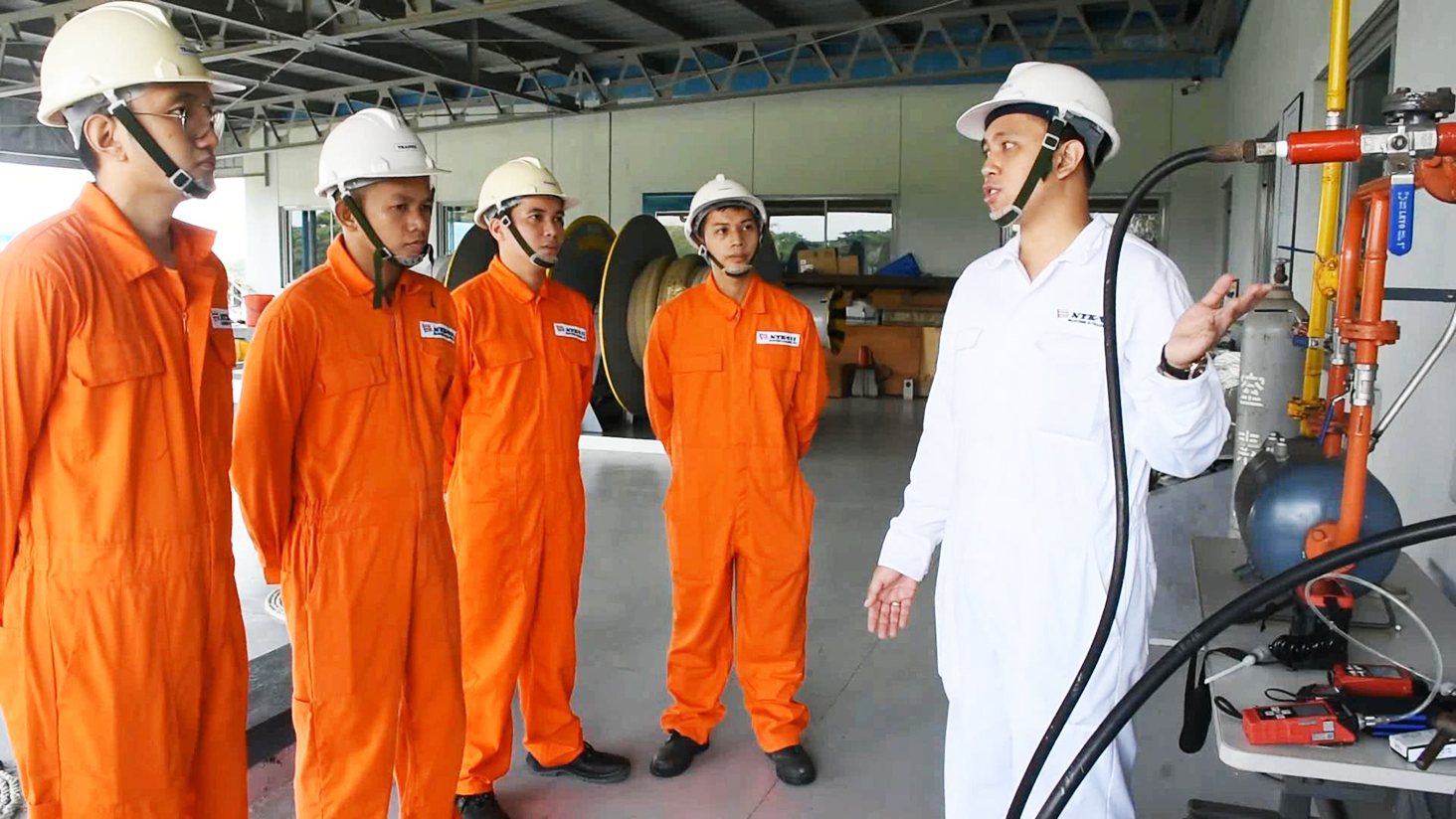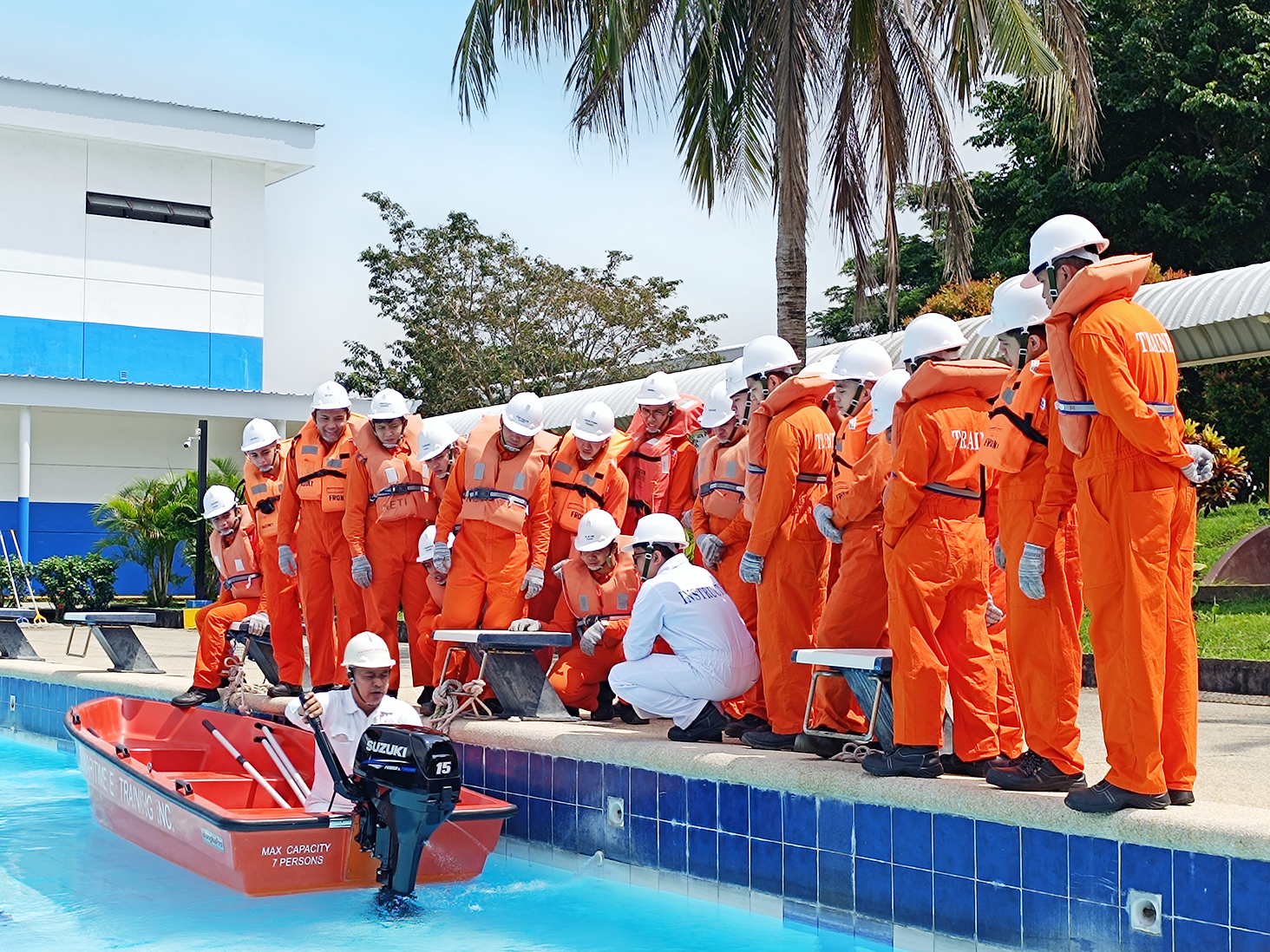Maintaining Our Focus on Safe Ship Operations
Safe ship operations have been fundamental to the business continuity of the NYK Group since its founding. Ensuring the safety of crew members and ships is essential for not only the reliable provision of services but also environmental protection, which preserves the beauty of the oceans for future generations.
The achievement of safe ship operations begins with the development of onboard personnel. We have therefore increased and enhanced crew member training to reflect various changes in the circumstances and requirements of maritime shipping in each era. Although ships have become increasingly specialized and operations have increased in complexity, our goal of maintaining safe ship operations has remained the same. No matter how cargoes and equipment change, our unwavering mission is to ensure quality and reliably deliver cargoes to customers. We cannot achieve this mission without the frontline onboard personnel who support safe ship operations.

Providing Opportunities for Continuous Learning
The NYK Maritime Education Technical Committee (N-MEC) makes decisions on policies for the education and training of crew members and cadets based on the NYK Unified Requirements. As secretariat of the committee, the Marine Group’s Coordination Team coordinates measures for entrenching knowledge and expertise related to safe ship operations among crew members.
Team manager Soji Masutomi, who has many years of experience working at sea, explains the kind of expertise that crew members require.
“In sailing large ships across vast oceans and safely transporting people and cargoes between ports, crew members perform a variety of tasks that call for a high degree of expertise. For example, they make decisions based on an understanding of the weather conditions, sea conditions, and geographical environments encountered during voyages as well as on an understanding of respective countries’ laws and situations. Expertise in the different methods of ship and cargo handling for each type of ship as well as in maintenance technic for large engines and other machinery is also required.”
Moreover, continuous learning is essential for maintaining safe ship operations. Masutomi elaborates on the required expertise and its acquisition.
“To achieve safe ship operations, each crew member must perform specialized tasks as a matter of course. However, this is easier said than done. A lot of time and experience are needed before crew members are actually able to perform tasks in a way that calls for a high degree of expertise. Our training courses help crew members learn by providing them with the basic knowledge they need and training that simulates the tasks they will actually perform on the front lines.”
Over the course of its long history, NYK has evolved its crew member training system to reflect external changes. Masutomi gives an overview of this evolution.
“In the 1980s, NYK, which until then had only crewed ships with Japanese crew members, began crewing ships with non-Japanese crew members in response to the gradual appreciation of the yen. These changes in the Company’s approach to crewing were accelerated at a stroke by a dramatic appreciation of the yen, which resulted from the Plaza Accord*1 of 1985, and by an increased emphasis on cost. Consequently, crew members born and bred in countries with different languages, cultures, and customs became part of crews that were deployed to and responsible for operating NYK Group ships.”
He explains further.
“The introduction of multinational crews made creating a system that gave crew members shared goals and a common understanding of safe ship operations more necessary than ever.”
The concept of the current NYK Maritime College crew member training program originates from this period.

A distinctive feature of the NYK Maritime College is that in providing educational opportunities it uses the same training curriculum, textbooks, and teaching methods, regardless of a crew member’s nationality and no matter where the training is held. Moreover, training is based on the NYK Unified Requirements, which are aimed at ensuring safe ship operations. NYK conducts training in seven countries around the world. Our main training centers are in Singapore and the Philippines. However, we also conduct training in Japan, Romania, Croatia, India, and Indonesia. In addition, we have built an e-learning system that crew members can access from any location.
Currently, the NYK Maritime College offers around 100 courses throughout the year. The courses clarify and develop the knowledge and skills required for each position. A wide range of positions are covered, from third officers and third engineers who have recently obtained navigation officer or engineer licenses through to captains, chief engineers, and the rating under their command. The quality and coverage of its training content and systems make the NYK Maritime College one of the best human resource development programs among shipping companies.
The college is operated by NYK’s wholly owned subsidiary NYK Shipmanagement Pte. Ltd. As a ship management company, the subsidiary is responsible for the provision of ship and crew member management services. The company’s general manager, Mitsuo Mori, is himself a captain as well as head of training center in Singapore. He explains the types of courses offered by the NYK Maritime College.
“The curriculum comprises mandatory courses, which are for all crew members and provide instruction on the basics, and optional courses, which crew members take optionally.”
From among numerous optional courses, crew members can select training suited to their particular career stage or skill set. The choices available include training on the engines of the next ship a crew member is due to board, cargo-handling training, training on next-generation fuels, and training that uses ship-handling simulators.
Developing as a College That Transcends National Borders
At present, more than 90% of the NYK Group’s operating ships have crews that include non-Japanese crew members. Mori says that the Company is making every effort to provide the same quality of training regardless of crew nationality and location.
“It is not easy to provide uniform training courses globally, but we should provide comprehensible training courses in consideration of diversity, crew members being from different countries and having different languages, cultures, and educational backgrounds and levels.”
Conducting training requires not only learning-related efforts but also numerous adjustments to accommodate the customs of crew members’ countries of origin. Mori describes some of these adjustments.
“Our trainees come from many different countries. Therefore, when organizing courses, we pay attention to the environment outside of the training itself, including accommodation facilities and meals. To create environments that show respect for the backgrounds of crew members, and which allow them to focus on training, we conduct investigative interviews and make preparations in advance.”
We constantly strive to ensure that all crew members are satisfied with their learning experience.
Systematizing Lessons Learned by Our Predecessors
The NYK Maritime College’s training courses continue to evolve with the establishment of new and improved courses.
Katsumi Masuyama, who is a member of the Marine Group’s Coordination Team and has many years of experience working at sea as a navigation officer, recalls his impressions after assuming his current position.
“When I joined the team, I realized anew the quality and extensiveness of the NYK Group’s training program. Looking into the details of each training course reveals our predecessors’ commitment to safe ship operations.”
Developed over NYK’s long history, the training courses draw on the accidents and problems experienced by our predecessors. Masuyama explains this aspect of the courses.
“With the aim of further enhancing the training program, the team regularly conducts investigative interviews focused on future training themes and cases that personnel want to learn about. When conducting these inquiries, we receive many requests for training on responses to accidents and problems that have occurred in the past.”
Mori emphasizes the importance of the past.
“Learning from past cases is critical. The safety of today’s ship operations is built on the experience and cautionary accounts of our predecessors. Our training courses are carefully prepared based on in-depth analyses of past cases. Repeated participation in these courses enables personnel to benefit from the legacy of said experience and cautionary accounts. In this way, we ensure the safety of our marine transport businesses and, in turn, the safety of crew members and many other stakeholders.”

Masutomi points out that the effectiveness of training cannot be readily expressed in numbers.
“Given that quantitatively measuring the effect that training has on safe ship operations is challenging, we take a qualitative approach. Our team’s mission is to carefully explain to all parties the benefits of training and how it leads to safety, to establish budgets, and to introduce and continue training.”
Initiatives to build and maintain training courses give concrete form to the mindset passed down by our predecessors.
Achieving Progress through Constant Effort
The realization of safe ship operations is the primary goal of the NYK Maritime College’s crew member training program. Masutomi is passionate about further advancing the crew member training that he and his team manage.
“I believe that safety is formed through consistent training. There are no shortcuts to safety. In my view, the same is true of training. Training courses that are perfect from the outset do not exist. Office staff repeatedly discuss and refine the details of essential training content. Also, the NYK Group has a Groupwide management system that supports the crew member training program. As an NYK employee, I am proud of this system, and I want to develop training courses that inspire similar pride in trainees.”
Mori’s duties at the training center in Singapore bring him into close contact with trainees. He is also strongly focused on constantly improving.
“I always say to trainees, ‘Life is about constant learning.’ Operating a ship is a specialized task that requires a great deal of knowledge. As individuals with responsibility for part of society’s infrastructure, crew members must continuously strive to improve and evolve. In supporting their efforts to ensure the safety of frontline operations, we will also continuously study in order to provide even better training.”
Drawing on the knowledge and expertise inherited from predecessors, the Marine Group’s Coordination Team will continue to provide learning opportunities for all crew members engaged in the NYK Group’s ship operations. The lessons learned by crew members while working at sea will also serve as foundations for safe ship operations. In accordance with the phrase “constant learning” the crew member training program will keep growing as it continues to underpin crew members’ confidence and safety at sea.

(Interview October 24, 2023)
- *1 Plaza Accord
This is the common name of an agreement that was primarily aimed at reducing Japan’s trade surplus with the United States. The agreement was announced on September 22, 1985, at a meeting of the finance ministers and central bank governors of five industrialized nations: the United States, the United Kingdom, West Germany, France, and Japan.





